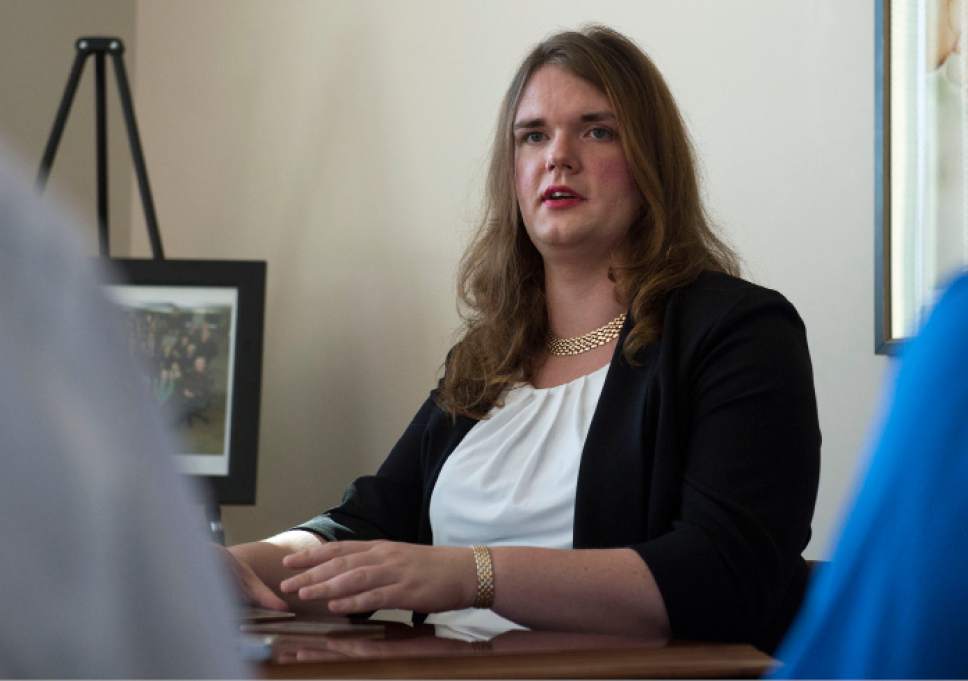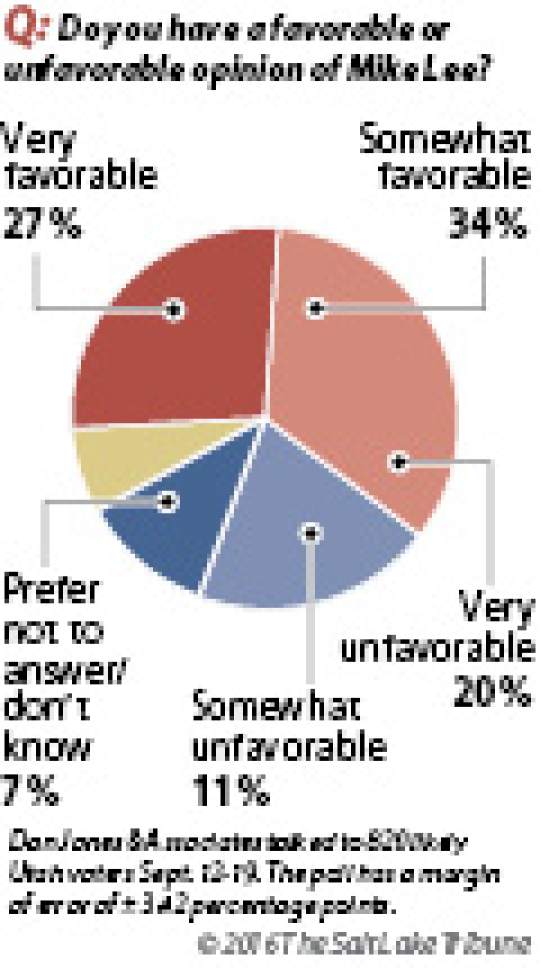This is an archived article that was published on sltrib.com in 2016, and information in the article may be outdated. It is provided only for personal research purposes and may not be reprinted.
In a nation where gay marriage is now legal, Sen. Mike Lee wants to ensure the federal government can't pull the tax-exempt status or deny a contract to an organization that still believes only a man and a woman should be able to wed.
But his Democratic rival, Misty Snow, says Lee's First Amendment Defense Act is promoting faith above fairness.
"He's trying to legalize discrimination in the name of religion," said Snow, who is the first transgender person running for a U.S. Senate seat from a major party.
Lee, R-Utah, counters that he's trying to stop discrimination, not perpetuate it.
"I don't think most Americans — I certainly don't think most Utahns — are OK with the federal government retaliating against a particular religious belief," he said. "This is one of the most pernicious forms of discrimination that exists."
Lee is the Senate sponsor, while Rep. Raul Labrador, R-Idaho, is the House sponsor. Both lawmakers are Mormon and such "religious freedom" proposals are a priority for leaders of The Church of Jesus Christ of Latter-day Saints. A new Salt Lake Tribune-Hinckley Institute poll found that only 2 percent of Utah voters ranked religious freedom as the most important issue facing the nation and only 3 percent said it was the top issue for Utah.
Lee came up with the bill after attending the oral arguments in the Supreme Court case that legalized gay marriage. Justice Samuel Alito, whom Lee once clerked for, asked the solicitor general if the case could result in a religious organization having its tax-exempt status revoked, the way the court had said a university could lose its favored tax status for denying access to interracial couples.
"It is going to be an issue,"said Solicitor General Donald Verrilli said.
Lee immediately thought of Brigham Young University. His bill would stop the federal government from taking action pertaining not just to tax-exempt status, but also to grants, loans, benefits or employment, which would protect student aid for the LDS Church-owned university.
Snow wouldn't directly say whether BYU should lose its tax-exempt status if it doesn't treat gay students the same as straight students, instead she called that a "drastic measure" the university should move to avoid.
"I would much prefer to see schools do the right thing and treat all of their students fairly and equally without any intervention from the government," she said.
Snow grew up in the Mormon faith and was baptized, but left in her teen years.
"I stopped going to church because of their homophobia," she said. "That is what drove me from their church."
Snow mentioned that her mother still attends Mormon services from time to time and that "all of my friends are LDS."
"I support religious freedom, but I don't support discrimination in the name of religion," Snow said. "There is a big difference between those two."
Lee's measure hasn't come up for a vote, and he intends to renew his push after a new president takes office in 2017. Donald Trump, the Republican nominee, at first wouldn't say whether he would sign the bill. He changed his mind in late September, updating a section of his website called "issues of importance to Catholics" to say he'd sign the measure.
Democratic presidential nominee Hillary Clinton has not weighed in on this legislation.
"It seems he might be better on religious freedom," Lee said of Trump in an interview with the National Review.
Still, Lee has refused to endorse Trump and has not said whom he will vote for in the presidential race.
Lee's proposal has no bearing on the interactions between people or between a private company and a customer, such as the often-mentioned example of a gay couple trying to buy a wedding cake.
Laws pertaining to those transactions are up to the states, Lee said. Asked if a company should be legally allowed to deny service to a same-sex couple, the senator said his focus is on federal law, not state code.
Snow said this is a basic question of equality.
"If you are going to serve somebody, if you are going to open a business, you should treat all of your customers equally or you should probably consider a different career choice," she said.
A similar dynamic is at play over President Barack Obama's order requiring public schools to allow transgender students to use the restroom of the gender with which they identify. Snow supports the move, while Lee said: "I don't understand why that needs to be a federal issue."
Lee is seeking a second Senate term and, at this point, holds a huge lead over Snow, a grocery store cashier who is running for public office for the first time. A UtahPolicy.com poll from August found Lee up 35 percentage points and the Tribune/Hinckley poll found Lee with an approval rating of 61 percent. The two candidates will appear at a debate Oct. 12 at 6 p.m., which will be live-streamed at sltrib.com.
Twitter: @mattcanham





